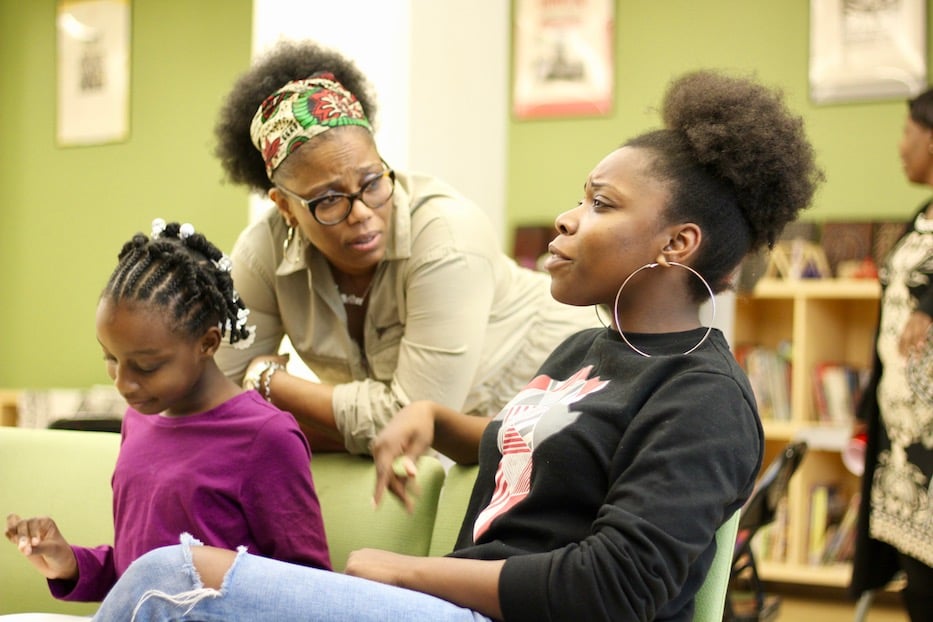
Bridgeport | Arts & Culture | Theater
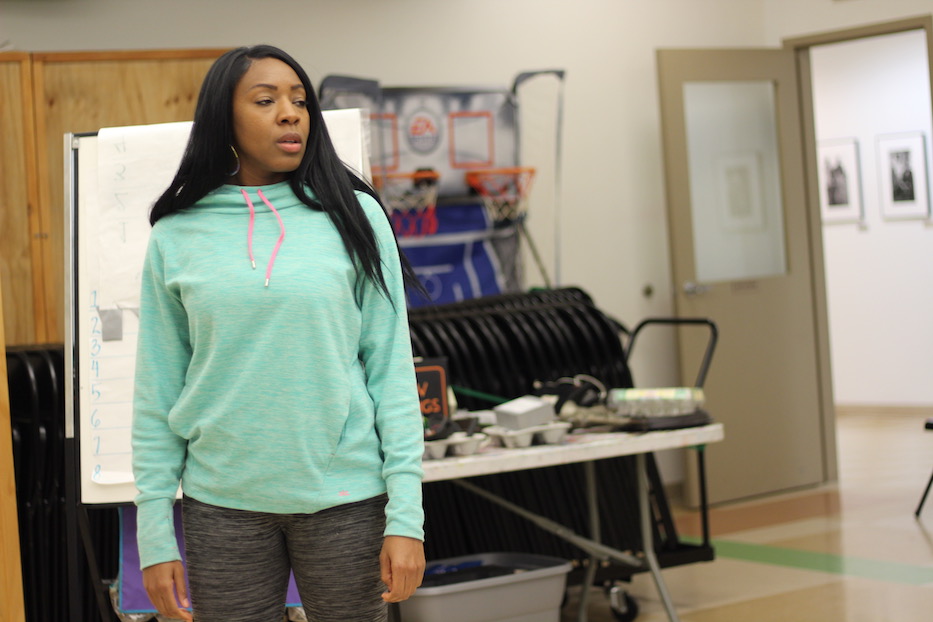
| Tamika Pettway as Kim Williams in Her Time. Lucy Gellman Photos. |
Kim Williams is back on her home turf. She climbs down from a bus, shakes off the 22-hour ride. No one’s there to greet her, but her feet know which way to go. Her eyes adjust even as she starts to walk. The city has aged a quarter of a century. She has aged a quarter of a century. The reality knocks the wind clear out of her.
“What happened to Church Street South?” she asks, eyes huge, and the audience can see the gaping wound on Union Avenue of which she speaks. “What happened to The Jungle?”
Testimony, faith, and astounding resilience underscore Her Time, a new work from playwright Steve Driffin and producer Charles Grady that comes to the Klein Memorial Auditorium in Bridgeport this weekend. The play, a sequel to Grady’s 2012 film The 5K Motion, follows Williams as she navigates life on parole after 25 years behind bars.
It is presented by the nonprofit Hangtime and its sister organization Her Time, a healing space for ex-offenders that Grady runs in Bridgeport, New Haven, Hartford, and Waterbury. Performances run Saturday at 3 p.m. and 7 p.m. and Sunday at 2 p.m. Tickets and more information are available here.
“What we’re really trying to do is highlight what we see and face everyday,” said Grady. “It isn’t spoken about enough.”

| Asia Murphy, Deidre Johnson and Kendall Driffin in Her Time. Lucy Gellman Photos. |
It’s a labor of love for the cast and creative team. Driffin is the youth and community programs manager at the Connecticut Center for Arts & Technology (ConnCAT) and Grady is a specialist with the FBI’s Community Outreach Program. Both have been working with the cast since August, when members came together for a table read and then began rehearsals each week at ConCAT.
Set in present-day New Haven, Her Time picks up two decades after The 5K Motion has ended, as Kim Williams (Tamika Pettway) is released 25 years into a 40-year sentence, at the age of 43. A short trial with a judge (Josh Wyrtzen) and sympathetic attorney (Valerie Brookshire) gives the audience all the exposition it needs: Williams was just a kid living in public housing when she got mixed up with the wrong crew.
There was a fight, and there was a gun, and someone died. She’s been punished with a disproportionately long sentence that has included giving birth in federal prison and being moved from Connecticut to Kansas, hundreds of miles away from her family.
When she says, half-pleading and half-ready, “I don’t know the world behind these bars,” the audience feels it acutely.
But to what degree, and for how long, neither she nor her viewers are totally aware of at first. When Williams is given parole in a mumbled half-apology and ticket for a 22-hour bus ride from the Topeka Correctional Center back to New Haven, it seems that the world is opening and closing to her at exactly the same time. When she returns to a city that she barely recognizes, those fears are confirmed.
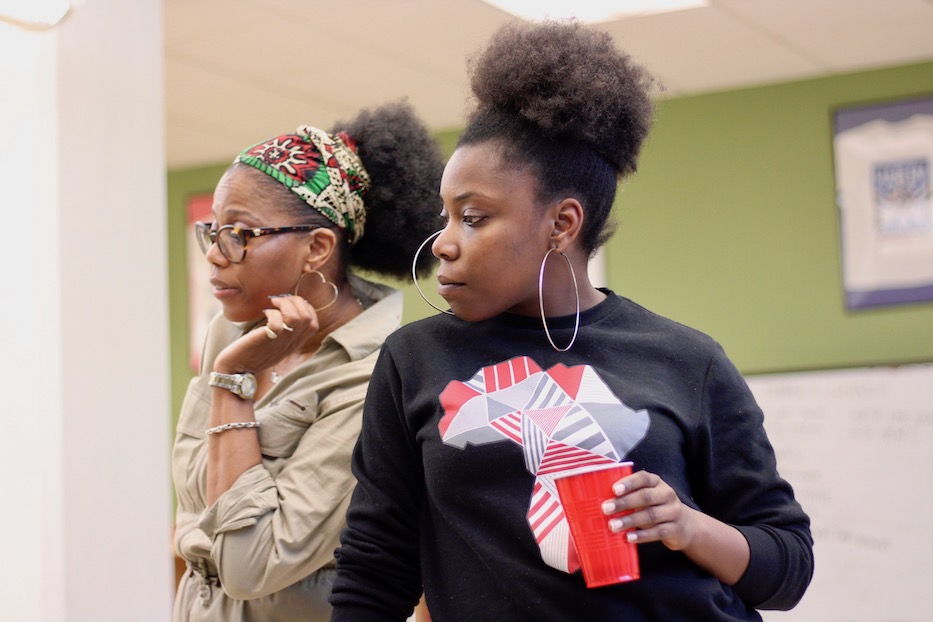
Her son Brandon (Alix Goubourn) and daughter Destiny (Kendall Driffin) don’t know how to greet this stranger who is also their mom. Her sister Jada (Deidre Johnson) overflows with love tempered by a sharp, smarting anger. Whole years have fallen into a void, nowhere clearer than in the existence of a granddaughter named Faith (Asia Murphy) and a villainous dealer named D-Lo (Oliver Lester) whose resentment smolders into hate, then threatens to bring the whole family down.
With equal parts grace and real, palpable frustration, Driffin and Grady tell a story that feels intimately familiar, because it is. Williams is the mom who wants to make up lost time with her children, but has to push through the very real family trauma that exists in re-entry. She has, in her words, “paid my debt to society” and is still turned down for every job, in a statement on the resounding limitations of “Ban The Box” legislation three years after it was celebrated at the State Capitol.
“It’s like the Jim Crow of employment,” Driffin said at a recent rehearsal. “Like, you’re out of prison, and we say that we’ll hire you, but we’ll find a reason not to.”
As Williams and her family try to navigate this new reality, the audience sees how quickly history can repeat itself. Gang violence is grafted onto multiple generations. Ex-offenders are turned down for employment despite proud crows of a second chance society. Hangtime shines like a bright beacon in a very dark night, but even its director Roland (a magnetic Rodney Moore) cannot be a panacea, so much as a piece of a much greater equation. That’s not just based loosely on reality—it’s lifted from the real-life stories Grady has heard in his organization.
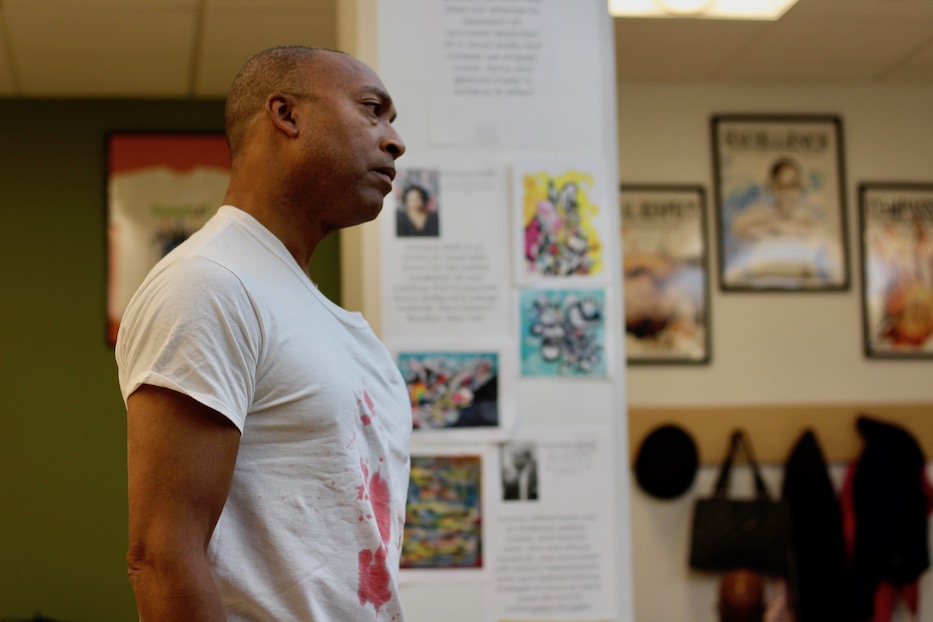
| Charles Grady as an understudy for Brandon in Her Time. Lucy Gellman Photos. |
“We have plenty of people that get hired on a temporary basis, and they tell the employer up front that they have a criminal background,” said Grady. “And the employer says, ‘oh, that’s no problem, we’ll wait for the background check to come back.’ They hire them for 60 days. And at the 60th day, they let them go when the check comes [back], because they’ve gotten some cheap labor out of them. And then they repeat the cycle.”
But for its bitter and very sharp edge, Her Time is also triumphant. Roland seems right on time when he warns Williams that “you don’t have the opportunities to press the reset button,” but she does have the present she’s in. Several times throughout the show, the fourth wall falls as characters address the audience, steeped in personal anecdote.
As they do, the language catches one’s ear. It’s both pedestrian and poetic, showing one how quickly the supposed sins of the mother—mere mistakes Kim made as a baby, pregnant with another baby—can repeat themselves in a world shaped by the so-called war on drugs, Regan-era policies, and both internalized and overt racism.
“For me, the most important thing the audience can take away is the struggles of re-entry are multi-layered,” Grady said in a recent interview at ConnCAT, taking a break halfway through rehearsal. “It’s not just hard to find a job. It’s not just people making promises that don’t come through. There’s that whole family element of ‘do I really know my mother? Do I really know my son? Do I really know my sister anymore?’ And if I don’t know them, why do I care about them?”
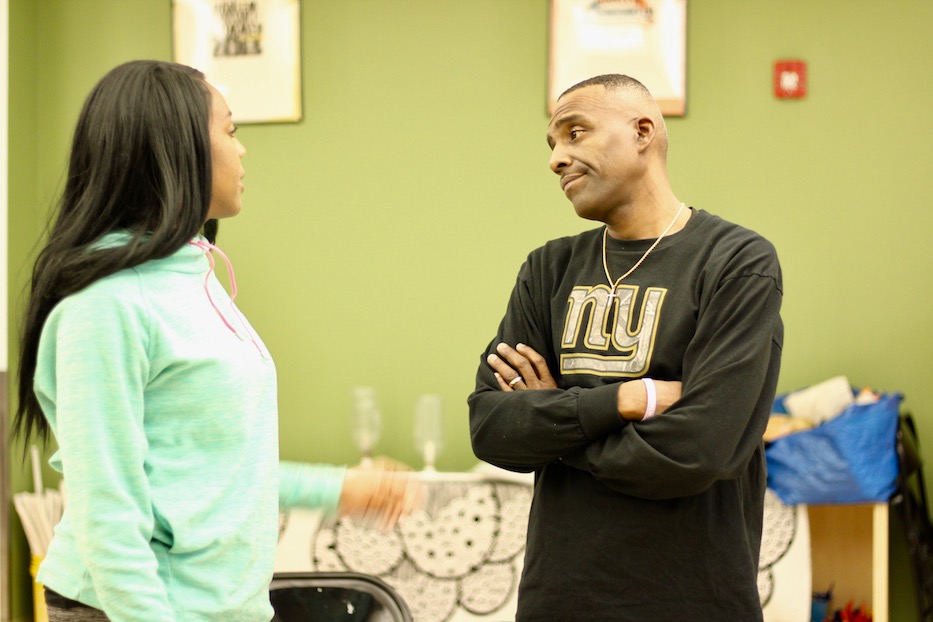
| Tamika Pettway and Rodney Moore in Her Time. Lucy Gellman Photos. |
Driffin and Grady don’t shy away from humor either, using it as both balm and buffer for some of their characters’ hardest moments. Nothing is sacred: the two praise the Black church as a bedrock of community and just as quickly point out its parsimoniousness and hypocrisy. They note the ineffectiveness of their local leaders who promise aid, and then can’t be found when that call for help comes in.
They take nonprofits to task for a frequent “one and done” approach, where sustained community engagement is rare, and sustained funding for Black and Brown communities is even rarer. They pepper their own gravitas with laugh lines that are candid and break the surface tension (“damn, baby! If you gonna haul ass you gonna have to take two trips!” Jada exclaims at one point).
The cast has brought it stunningly to life. As Tamika Pettway takes on the role of Kim Williams, the audience sees a world that has hardened too quickly, but also another one where grace and kindness (and indeed, real-life second chances) are possible. Across from her, Johnson builds the backbone of the show, propelling it forward as Goubourn, Driffin, Murphy and Lester bring its high-stakes drama right into the present.
As it opens this weekend, Grady and Driffin said they are hoping to share the work not just in Connecticut’s cities, but also on a national scale. Its relatability isn’t meant to be shocking or political, Driffin said—it’s meant to tell a story about a system that still hasn’t changed, and the people who get caught in its machinations.
“The more things change, the more things stay the same,” he said at a recent rehearsal. “This is not new, people being incarcerated and coming out. This is not a new subject matter. I don’t want it to be sexy or trendy. If we’re really gonna try and promote a type of change, I’m hoping that this piece really allows people to look at the lives of people.”
Performances of Her Time run Saturday at 3 p.m. and 7 p.m. and Sunday at 2 p.m. Tickets and more information are available here.

